South Los Angeles track athlete Breanna Clark and Inglewood swimmer Jamal Hill will be competing in the Paralympic Games; View Park resident Arthur Lewis reminisces on the three Paralympic Games that he competed in.
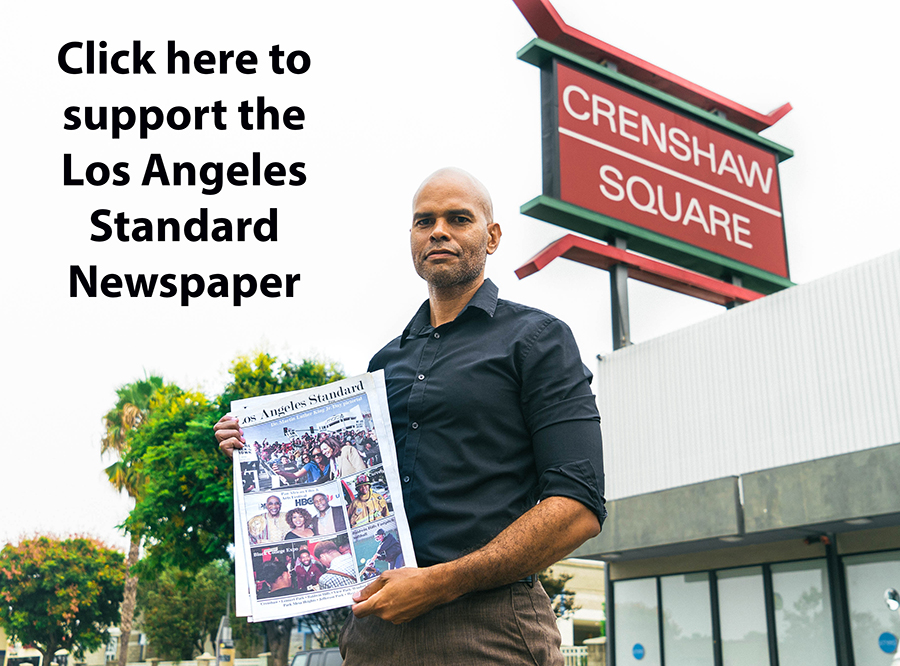
By Jason Lewis
The spirit of the Olympic Games continues as local athletes who have disabilities are heading to the Tokyo 2020 Summer Paralympic Games. These athletes have been training for years for their opportunity to compete against the world’s best as they represent their country. The Paralympic Games take place between August 24 and September 5, and will be broadcast on NBC Sports.
Breanna Clark, track and field
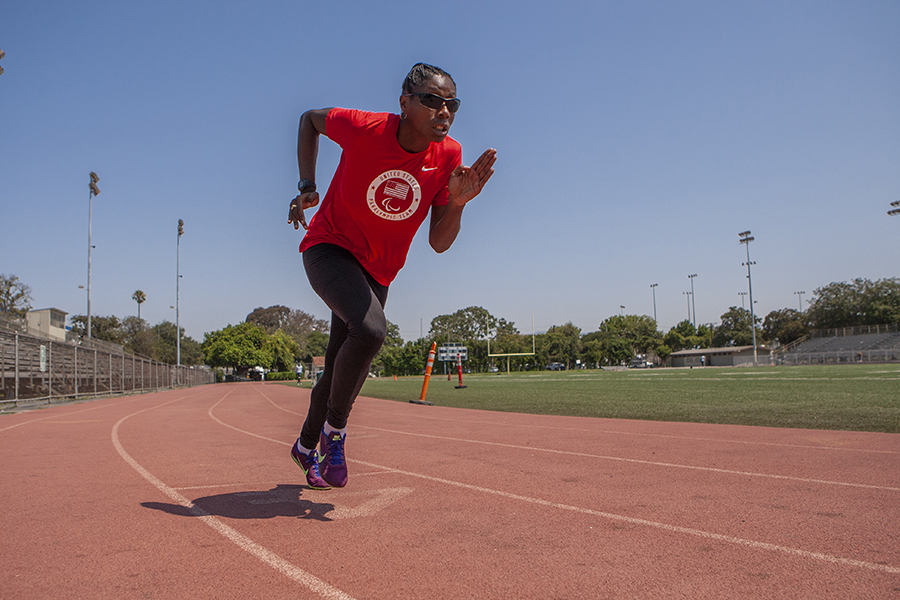
Breanna Clark comes from a very athletic family. Her mother Rosalyn Clark (formerly Rosalyn Bryant) won a silver medal in the 4x400 meter relay at the 1976 Summer Olympics in Montreal, Canada, and she placed 5th in the individual 400-meter dash. Her father Gary Clark played football in the NFL, and her twin brother Rashard Clark won the Los Angeles City Section championship in the 400-meter dash and 200-meter dash in 2012 while at Dorsey High School. Rashard also won the 2020 U.S. indoor 400-meter championship.
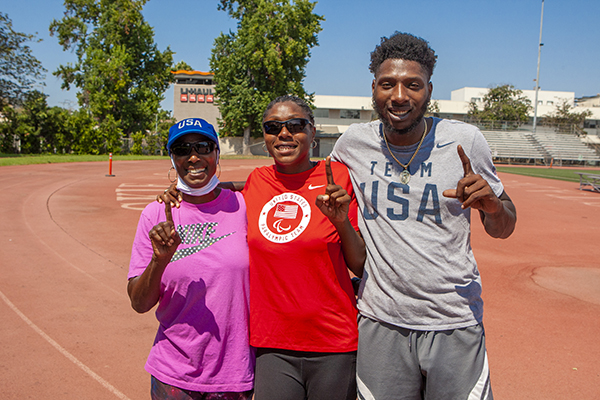
Breanna Clark is blazing her own trail, as she is the defending Paralympic champion and world record holder in her division in the 400-meter dash. Clark has a mental impairment, but she’s very forward and to the point about her goals.
“I’m training hard, I believe in myself, and I expect to win a gold medal,” she said.
Clark, who started competing in track while in middle school at View Park Prep and also competed at Dorsey High School, won the gold medal at the 2016 Rio De Janeiro Paralympics Games in Brazil, and she set the world record a year later at the world championships in London, England. She has also competed at the world championships in Dubai. International competition has allowed her to have some special experiences.
“I met a lot of new people, tried new foods, and experienced new things,” she said.
Clark’s mother has seen growth in her daughter because of these competitions.
“I think that the most important thing that she’s gotten out of the Paralympics is that she’s become more independent,” Rosalyn Clark said. “Because being out there, and doing the things that she has to do, some of those things I can’t be there. Like in Brazil, I was not allowed to go into the village or be on the practice track. So she had to grow and become more independent, and learn how to do things without me.”
Rosalyn Clark uses her track expertise to coach her daughter, and their training became difficult because of the pandemic. They typically train at Jackie Robinson Stadium at Rancho Cienega Sports Complex, but the track was closed for several months.
“The training has been good but tough, especially during the pandemic,” Rosalyn Clark said. “We had to find creative things to do. We had to find places where we could train. Parks, beaches, and we had to sneak into this track because it was locked up. There was a gate next to where the homeless people were staying. They had cut a hole in the fence, and we were able to sneak in and train.”
Breanna Clark completes on August 30 and 31. Follow her on Instagram @breanna_clark94
Jamal Hill, swimming
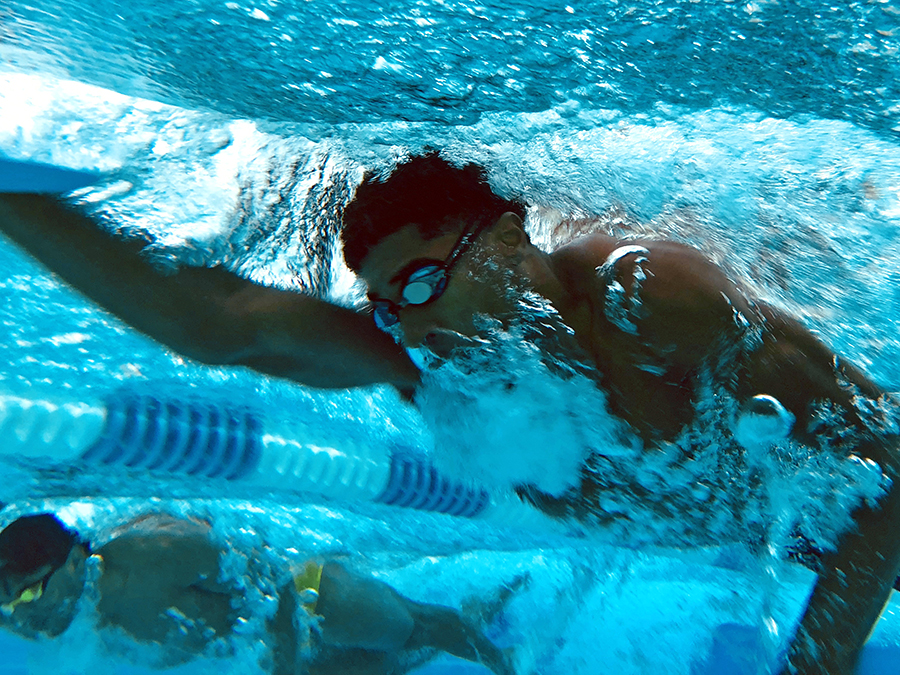
Inglewood native Jamal Hill has become a well-known and inspirational figure within the Paralympics world, and he’s had his sights set on the 2020 Tokyo Paralympic Games for several years.
On first sight, Hill appears to be a very well-built elite athlete. He’s just as muscular and sleek as any other swimmer. But he suffers from Charcot-Marie-Tooth disease, which is an inherited disorder that causes nerve damage, mostly in the arms and legs. This results in smaller, weaker muscles; loss of sensation and muscle contractions, and difficulty walking.
This disorder used to mentally and emotionally bother Hill.
“People see me and they're like, ‘wow you look so strong, I can't even imagine that there's something wrong with you,’” he said. “For a long time it was a point of shame for me. I never talked about it. I knew that I didn't want to be handicapped by it, but I also did a lot of emotional and mental handicapping on myself. I felt cursed.”
Hill decided to start talking about it with other people who are affected by the disorder, and it has greatly encouraged him to stay positive. And in turn, he has also helped others who have the disorder to follow their dreams.
“There's tons of people around the world that I've been able to converse with, that I've been able to relate with, and that I've been able to give hope to. I've been able to tell people that I know that this is how it is and we all wish that we could change it but it doesn't have to stop us. We have to change here and we have to adapt there, but you’re no less human, you’re no less of a person, you’re no less deserving, and you’re definitely no less capable.”
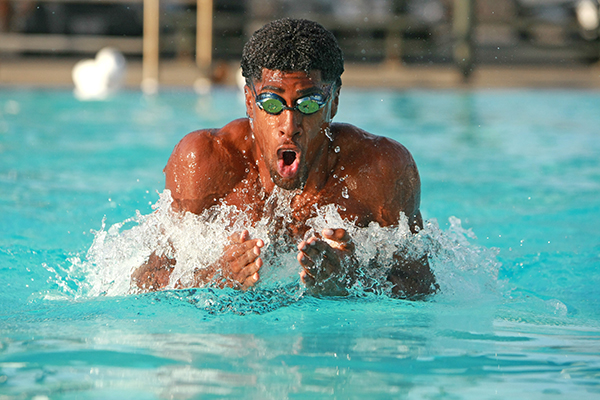
Hill has adapted to the disorder by learning to recruit other muscles to propel himself through the water at a high rate of speed.
“I don't like to call it a handicap,” he said. “I call it concentrated energy. Like a superhero, like Daredevil. He lost his eyesight but then he had super senses.”
Hill has grown up in the swimming pool. His mother did not learn how to swim as a child, so when he was young, she signed them up for mommy and me swimming classes. He grew up near Crenshaw Boulevard and Imperial Highway in Inglewood, and he frequently swam at the Westchester YMCA and the Lou Dantzler Boys and Girls Club in South Los Angeles. He competed on the swim team at Serra High School in Gardena, which earned him a scholarship to Hiram College in Ohio.
After competing in college for two years, Hill decided that he wanted to be trained by the best swim coaches in the nation. He landed on USC’s Trojan Elite team, which is a post-graduate, professional swim team.
“I'm swimming with Olympians, former Olympians, some of the fastest swimmers in the world,” he said. “I’m picking up lots of knowledge and I'm learning.”
Currently Hill is being trained by Wilma Wong, who coaches nationally ranked swimmers at the Boys & Girls club in Pasadena. Under Wong’s guidance, Hill is the top ranked Paralympian in the nation in the 50-meter freestyle and No. 6 in the world.
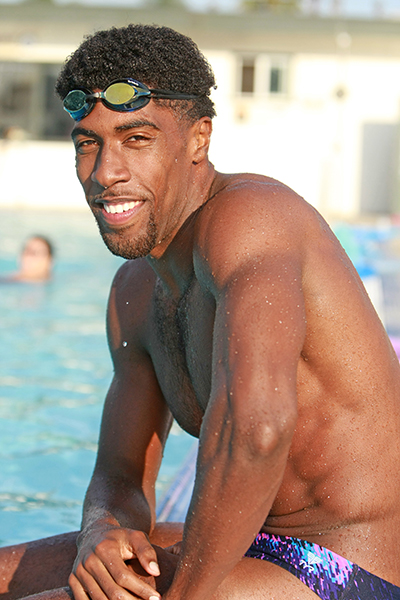
Besides the goal of competing in the Paralympics, Hill is also an inspirational speaker and he has the goal of teaching one million people how to swim. He plans to personally teach as many people as possible, and also influences the masses to take swimming lessons. He started a marketing company called Swim Up Hill to help people find classes, and help swimming programs promote their lessons to the public.
Hill has turned his disorder from a negative into a positive to help people with their own issues.
“The things that we think are holding us back, that are these curses on us, that we just wish weren't there. The things that we wish we could wish away are there for a reason,” he said. “We need to wish that we knew how to use them.”
Hill competes on August 27, 5-7 pm, August 28, 1-4 am, 5-7 pm, August 29, 1-4 am and 5-7 am, and September 2nd, 1-4 am. All times PST.
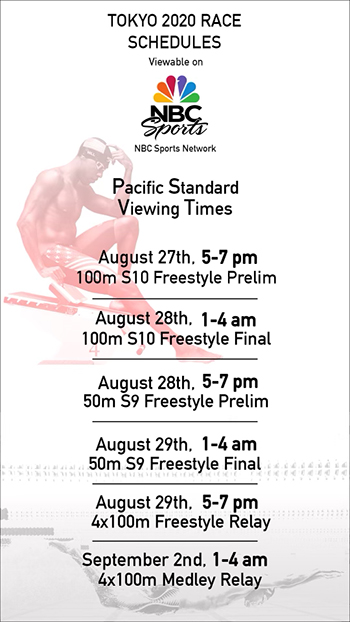
For more information on Hill, visit his website at www.swimuphill.com, and follow him on social media.
Local legend Arthur Lewis, track and field
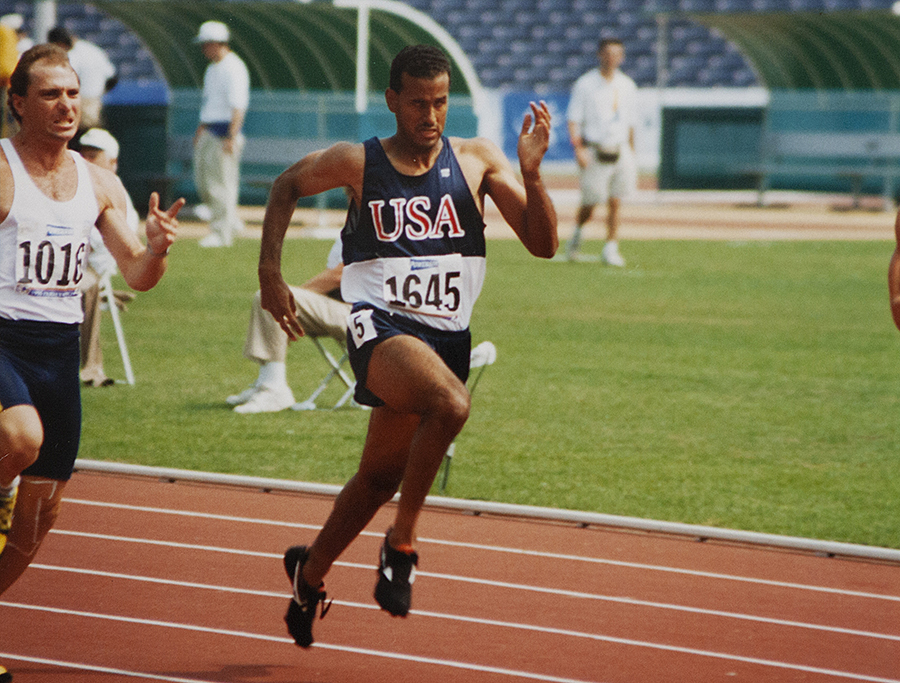
Arthur Lewis competed in three Paralympic Games and three World Championships spanning from 1992 to 2000. He grew up in Mid City, near Crenshaw Boulevard and Washington Boulevard, and he currently resides in Hyde Park.
As a visually-impaired athlete, he competed at Marshall High School in the 100, 200, and 4 x 100-meter relay. While a college student at the University of California, Irvine (UCI), he joined the Paralympic team and competed in the 1992 Paralympic Games in Barcelona, Spain. He tied for third place in the 100-meter dash, but the bronze medal was given to the other athlete in a tie breaker.
At the 1996 Paralympic Games in Atlanta, Lewis won bronze medals in the 200-meter dash and 4x100-meter relay.
Lewis captured the gold medal in the 4x100 meter relay at the 1994 World Championships in Berlin, Germany, which was a very interesting experience because the track events were held at the same stadium that Jesse Owens upstaged Adolph Hitler as he captured four gold medals at during the 1936 Olympic Games.
“We thought about Jesse Owens constantly,” Lewis said. “His name is all over the stadium. They played the national anthem for us in front of Hitler’s box. That was pretty exciting.”
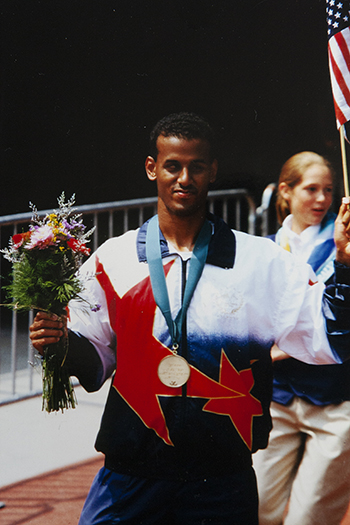
International competition brought out national pride in Lewis and his teammates, and they knew that they had targets on their backs from competitors from other nations.
“Before the race our coach told us, ‘You know you’re going to have to win the race because the Europeans really hate it when they play the Star Spangled Banner in places like Germany and France,’” Lewis said. They hate to hear it.”
Traveling internationally was an amazing experience for Lewis, as was competing against other athletes who have disabilities.
“It was like going to a different world,” he said. “Everything was bright and colorful, and different, and new and exciting. I got to meet people who were in the same situation that I was in, and see what they were like. And I got to see what people were like from other countries. It was exciting to see people from all around the world.”
It was important for the athletes to not get too caught up in the moment of competing on a world stage because they did have a job to do.
“One of the coaches told us to tune out everything that was going on around us, and focus on what you know how to do,” Lewis said. “And don’t pay attention to our competitors and the things that they’re saying and the things that they’re doing. We were seeing a lot of things for the first time. If we were just focused on running the 100 or the 200, we would do better than to look at all of the things that we’re going on around us.”
After graduating from UCI with a degree in computer science, Lewis attended graduate school at UCLA, and he was honored with other UCLA athletes who were Olympians during halftime of a UCLA football game at the Rose Bowl. To his surprise, some of the other Olympians who had become household names recognized him.
“When I was training for Atlanta, I met Gail Devers (UCLA) on the track working out, and she had remembered me,” he said. “She also saw me in Philadelphia and remembered me. It was pretty exciting to see Gail Devers out there giving me encouragement.”
For more information about the Paralympic Games, visit www.teamusa.org/Tokyo-2020-Paralympic-Games











